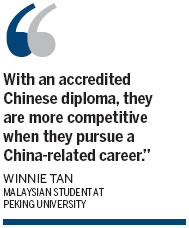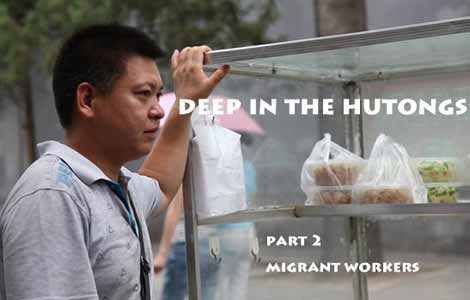Sino-ASEAN degree recognition in the works
Updated: 2013-10-13 08:21
By Zhou Wa (China Daily)
|
||||||||
Malaysian student Winnie Tan realizes she is in a fortunate position as the degree she earned at Peking University is also recognized in her home country.
"After I finish studying in China, I can sit Malaysian exams for professional certification in urban planning, although my degree was not obtained in Malaysia," she said.
Tan is not alone in enjoying the convenience of credits transfer and degree recognition concerning universities in China and the member states of the Association of Southeast Asian Nations.
Chinese and ASEAN education officials are pushing for an integrated system on mutual degree and qualification recognition in higher education.
During the Sixth China-ASEAN Education Cooperation Week held in Guizhou province in September, education officials from China and ASEAN countries exchanged ideas on transferring credits between Chinese and Southeast Asian universities, clarifying their own degree and diploma systems, and determining how to guarantee education quality under an integrated system.
"Along with deepened cooperation between China and ASEAN members in various fields, China is now pushing hard for education cooperation with these Southeast Asian countries," said Zhang Xiuqin, head of the Chinese Ministry of Education's Department of International Cooperation and Exchanges.
"An integrated education system with the possibility of credit transfers and mutual degree recognition can inspire more ASEAN students to study in China and Chinese students (to study) in Southeast Asia," she said.
So far, China has signed mutual higher education-degree and diploma-recognition agreements with Malaysia, Thailand, Vietnam and the Philippines. The agreements offer policy and legal support to Chinese and Southeast Asian overseas students and guarantee education cooperation between China and those countries.
Zhang said China is making efforts now to sign such agreements with six other ASEAN countries.
Diploma accreditation, as an important part of mutual qualification recognition, is a crucial measure to guarantee the quality of students who studied overseas, said Li Ping, director of the China Academic Degrees and Graduate Education Development Center's Verification Department.

An authorized accreditation of Chinese diplomas will help ASEAN students find better jobs or continue higher education more easily, Li told reporters. She added that her center, which is affiliated with the Ministry of Education, has offered diploma accreditation to more than 500,000 students who obtained Chinese diplomas since 2000.
This inspires hope in Tan.
"Most of my colleagues at Peking University from Malaysia found good jobs when they went back home," Tan said.
"With an accredited Chinese diploma, they are more competitive when they pursue a China-related career."
She is in her last year as an undergraduate student in urban planning at Peking University and looks forward to obtaining a master's degree in China before returning to Malaysia to take professional certification exams.
Izzati Ahamad, a 17-year-old from Brunei who studied in the Guangxi Zhuang autonomous region, said her experience in China made her understand the real China better and will help her when she does business with China back home.
She told China Daily she expected to "learn from study in China how the country has achieved such dynamic development during the past decades".
And she will share tips with people in her country about how to do business with China.
But education integration must overcome obstacles before its full potential can be realized.
"The so-called education integration offers a splendid blueprint for China-ASEAN education cooperation, but there are still many difficulties to overcome before really realizing such an integration," the development center's deputy director Wang Lisheng said.
Mutual qualification recognition is a precondition for education integration between China and ASEAN members.
It not only refers to higher education in universities but also to diploma and vocational education, which is very complicated, Li said.
Zhang, with the Education Ministry, said the different education systems and levels of social development also create difficulties to realizing mutual qualification recognition.
China and ASEAN countries should sort out their domestic education as soon as possible, so they can make degree and diploma comparisons among different countries and, therefore, realize mutual recognition, Wang, with the center, said.
Time is still needed for more communication between teachers and students, Shao Wei, secretary-general of the China Education Association for International Exchange, told Chinese media.
Through such communications and exchanges, Chinese and ASEAN universities can figure out possible cooperation projects, which can facilitate education integration, he added.
By the end of 2012, there were more than 110,000 Chinese students studying in ASEAN countries, while the number of ASEAN students in China surpassed 60,000.
China has created majors in language studies, which target the mother tongues of all the 10 members of ASEAN, while opening 29 Confucius Institutes for promoting Chinese language and culture in the 10 countries.
zhouwa@chinadaily.com.cn
(China Daily 10/13/2013 page3)

 Migbelis Castellanos crowned Miss Venezuela 2013
Migbelis Castellanos crowned Miss Venezuela 2013
 Chongyang Festival: Secrets to longevity
Chongyang Festival: Secrets to longevity
 Mo Yan's Nobel win brings village a change of plot
Mo Yan's Nobel win brings village a change of plot Cruise trip adds leisure to travel
Cruise trip adds leisure to travel
 Chemical weapon watchdog wins Nobel
Chemical weapon watchdog wins Nobel
 China, Thailand eye waiving visas
China, Thailand eye waiving visas
 What does paradise smell like?
What does paradise smell like?
 Second American in orbit dies at 88
Second American in orbit dies at 88
Most Viewed
Editor's Picks

|

|

|

|

|

|
Today's Top News
Fast track relations for rail
Man hospitalized years after amputating own leg
Deal to resolve fiscal crisis stalls in Congress
Visa exemption to promote ties
Edward Snowden meets father in Russia
China on alert for Typhoon Nari
G20 urges US to act quickly to avoid default
China can learn from US in shale gas exploration
US Weekly

|

|







